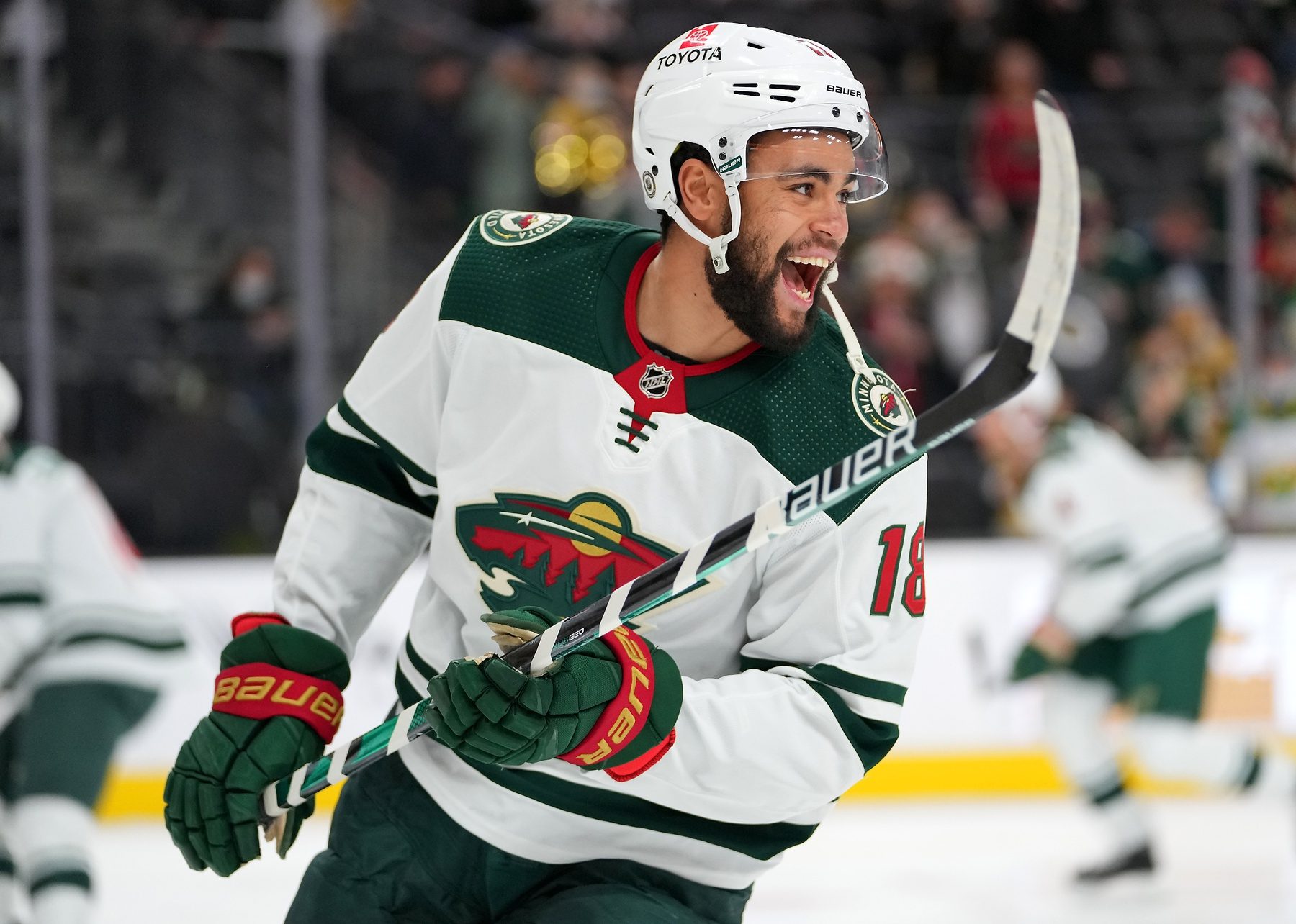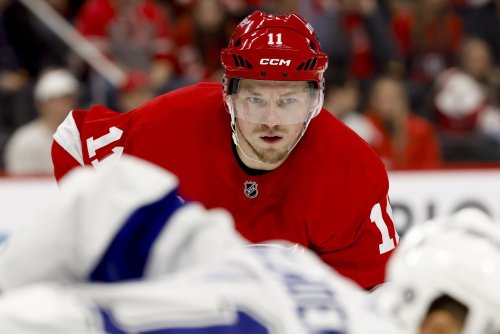
Ever since Minnesota Wild general manager Bill Guerin decided to buy out Zach Parise and Ryan Suter's 13-year contracts, "cost certainty" became the name of the game in Minnesota. Virtually every move from that point wasn't just about getting bargains but stretching them out through the worst of the buyout penalties.
Ryan Hartman's super-cheap contract doesn't quite last until Summer 2025 when $13 million of dead cap hit comes off the books. However, it bridges two of the worst years of this with an affordable center under wraps. Joel Eriksson Ek's eight-year contract is a bargain, but a particularly needed one in the first four years. Now Guerin can operate without worrying about paying his shutdown center more than $5.25 million.
That strategy is continuing with his decisions this year. The current controversy over Marco Rossi is a debate over the value of cost certainty. Not playing him this year will preserve a super-cheap entry-level deal into the 2024-25 season. Jon Merrill's three-year contract locks down a six or seventh defenseman into that season. One less thing to worry about then.
Cost certainty is also why Jordan Greenway's new $3 million AAV contract came in at three years. It doesn't lock him in at a crazy bargain like Hartman's contract did. And the Wild only bought one year of unrestricted free agency, unlike the five they got from Eriksson Ek.
However, it means Guerin can't pay Greenway more than $3 million until that all-important $13 million evaporates. For the next two years, their shutdown line of Greenway, Eriksson Ek, and Marcus Foligno is locked in at under $12 million. Again, one less thing to worry about, at least until Foligno's contract is up.
If it sounds weird that the analysis starts not with Greenway's contributions, but the contracts of two guys who aren't on the team anymore, you're right. It is weird. But this unique circumstance has such a powerful pull on the Wild's future that it has to be the focus.
Minnesota will effectively be forced to operate with a salary cap of $68.5, $66.5, and $66.5 million in the next three years while the rest of the league gets to play with $81.5 million. Unfortunately, that's the first consideration you have to make with any Wild contract now. Any deal has to get surplus value out of it for it to be worth it.
Does Greenway deliver that? It depends on who you ask.
Guerin certainly thinks so. "Jordan will keep getting better and better," he told the media over Zoom on Feb. 1. "He's been a big part of that line with Eriksson Ek and Foligno, [and that's] something that we want to keep around. They're well-known throughout the league as being a strong line. They've definitely helped us to create an identity as well."
Ask Jordie Benn, and he'll give you his first-hand account of facing him and his linemates. "They're tough to handle. I do it every day in practice. You get stiff-armed, and you can't do anything about it. It's crazy that you can be that big and move that good."
There's no doubt that line contributes to Minnesota winning. There are 114 forward lines that played 100-plus minutes at 5-on-5. Greenway's line controls 61.9% of the expected goal share, 18th among that group. Their defense, in particular, remains outstanding. They're one of three lines in that group that hasn't surrendered a goal.
A 24-year-old being part of such a critical line is easily worth keeping around in almost any other circumstance. Greenway's contract projection last year was two years at around $2.6 million, per Evolving Hockey. The money's about right, especially if Minnesota is correct that Greenway's game took a step this year.
Again, the problem is that the Wild are dealing with an extraordinary hardship. A move that might be a no-brainer for 31 other teams might not be optimal for Minnesota. The question isn't, "Is Greenway worth $3 million?" He almost certainly is. It's "Does Minnesota needs to spend $3 million to do the stuff Greenway does?"
That's a murkier question, which comes down to whether or not he's irreplaceable on that line. That line plays lockdown defense, but since the 2019-20 season, Foligno and Eriksson Ek are second and 15th among forwards in even-strength defensive impact. Shouldn't a line with two Selke-caliber players be good defensively, no matter what?
The three work well as a unit, but let's try to isolate their impact a bit. Here's how the three forwards perform together, then how they perform when only paired with one of their regular linemates. We're using Natural Stat Trick (which has a slightly different expected goals model) and looking at them since the start of 2019-20.

Two things jump out right away. The first thing is, the three of them together is clearly the best of the bunch. They've surrendered so few expected goals that it's inhuman and did it over a 650-minute sample. Controlling 63.4% of the overall expected goal share is jaw-dropping as well.
The second thing is if you take Eriksson Ek or Foligno out of the equation, their performance drops off much more than when Greenway is absent. The combination of Eriksson Ek and Foligno gives up a bit defensively without Greenway, but they make up for it by adding over half a goal to their expected total.
Meanwhile, Greenway's play suffers with playing with either but not both of his linemates. In both cases, they're not only failing to turn the tide towards Minnesota, but they're also underwater, surrendering more expected goals than they generate.
Does that matter, though, if that line is at its best with Greenway? Greenway might be the third-best player on that line, but his presence gives it three fast, powerful forecheckers. Their skill combined with those attributes makes a punishing style that's almost unmatched in today's NHL.
While that's true, the question remains: Can anyone fill that role for less money? The answer might be yes. Brandon Duhaime is also big, fast, and plays the same hard, forechecking style. Here's how the two match up this season:

Greenway's better, thanks to taking an edge defensively and in penalties. Duhaime's not far behind, though. But Duhaime's given Minnesota about the same offensive value while remaining above the 50th percentile defensively. On an individual basis, Duhaime both has an edge on Greenway in points per hour (1.7 to 1.5) at 5-on-5, despite being on the fourth line.
It's not absurd to think Duhaime couldn't improve if given a shot as the third player on that line. Even if he remained exactly the same, though, is Greenway so much better that Minnesota had to spend $2.25 million more than Duhaime would command next year? Probably not.
Assuming Calen Addison and Rossi are on next year's roster, Minnesota has about $9.5 million to spend on six roster slots. Could $2.25 million be the difference between keeping or losing Kevin Fiala, who's looking terrific alongside Matt Boldy? It very well might, and if so, the Wild will lose a player who's averaging 30 goals and 67 points per 82 games over these last three seasons.
Or, speaking of Boldy, will the Wild long for that extra $2 million two summers from now, when they have to re-sign him, find a starting goalie, and fill out (as of now) eight more roster spots for $21 million? It's possible this contract makes an already tight situation tighter.
So by the end of this time in cap hell, this contract will be judged by how much Greenway can out-perform it. Right now, $3 million is about fair value, but it'll need to be more to prove he couldn't have been replaced by cheaper options. Guerin, for one, is confident that his ceiling is higher than what we've seen.
"We definitely know what his floor is. I know his production can improve, but I think he's continuing to be a more consistent player. Could he score 20 goals? I think he could. He has to do some smaller things like shoot the puck a bit more, and hit the net when he does. As long as he keeps bringing his identity and that line's identity on a consistent basis, we'll be OK."
If he's right, Greenway's contract will be seen as a brilliant bargain. If not, then it's an OK contract at a time where the Wild are most vulnerable to being burned by OK contracts.
Think you could write a story like this? Hockey Wilderness wants you to develop your voice, find an audience, and we'll pay you to do it. Just fill out this form.





.thumb.jpg.a9b35df58693aa7a574a96bc7e6aac74.jpg)

Recommended Comments
There are no comments to display.
Join the conversation
You can post now and register later. If you have an account, sign in now to post with your account.
Note: Your post will require moderator approval before it will be visible.